- Home
- Lewis Carroll
Alice's Adventures in Wonderland and Through the Looking Glass (B&N) Page 9
Alice's Adventures in Wonderland and Through the Looking Glass (B&N) Read online
Page 9
“Come, we shall have some fun now!” thought Alice. “I’m glad they’ve begun asking riddles—I believe I can guess that,” she added aloud.
“Do you mean that you think you can find out the answer to it?” said the March Hare.
“Exactly so,” said Alice.
“Then you should say what you mean,” the March Hare went on.
“I do,” Alice hastily replied; “at least—at least I mean what I say—that’s the same thing, you know.”
“Not the same thing a bit!” said the Hatter. “Why, you might just as well say that ‘I see what I eat’ is the same thing as ‘I eat what I see’!”
“You might just as well say,” added the March Hare, “that ‘I like what I get’ is the same thing as ‘I get what I like’!”
“You might just as well say,” added the Dormouse, which seemed to be talking in its sleep, “that ‘I breathe when I sleep’ is the same thing as ‘I sleep when I breathe’!”
“It is the same thing with you,” said the Hatter, and here the conversation dropped, and the party sat silent for a minute, while Alice thought over all she could remember about ravens and writing-desks, which wasn’t much.
The Hatter was the first to break the silence. “What day of the month is it?” he said, turning to Alice: he had taken his watch out of his pocket, and was looking at it uneasily, shaking it every now and then, and holding it to his ear.
Alice considered a little, and then said “The fourth.”f
“Two days wrong!” sighed the Hatter. “I told you butter wouldn’t suit the works!” he added, looking angrily at the March Hare.
“It was the best butter,” the March Hare meekly replied.
“Yes, but some crumbs must have got in as well,” the Hatter grumbled: “you shouldn’t have put it in with the breadknife.”
The March Hare took the watch and looked at it gloomily: then he dipped it into his cup of tea, and looked at it again: but he could think of nothing better to say than his first remark, “It was the best butter, you know.”
Alice had been looking over his shoulder with some curiosity. “What a funny watch!” she remarked. “It tells the day of the month, and doesn’t tell what o’clock it is!”
“Why should it?” muttered the Hatter. “Does your watch tell you what year it is?”
“Of course not,” Alice replied very readily: “but that’s because it stays the same year for such a long time together.”
“Which is just the case with mine,” said the Hatter.
Alice felt dreadfully puzzled. The Hatter’s remark seemed to her to have no sort of meaning in it, and yet it was certainly English. “I don’t quite understand you,” she said, as politely as she could.
“The Dormouse is asleep again,” said the Hatter, and he poured a little hot tea upon its nose.
The Dormouse shook its head impatiently, and said, without opening its eyes, “Of course, of course: just what I was going to remark myself.”
“Have you guessed the riddle yet?” the Hatter said, turning to Alice again.
“No, I give it up,” Alice replied. “What’s the answer?”
“I haven’t the slightest idea,” said the Hatter.
“Nor I,” said the March Hare.
Alice sighed wearily. “I think you might do something better with the time,” she said, “than wasting it in asking riddles that have no answers.”
“If you knew Time as well as I do,” said the Hatter, “you wouldn’t talk about wasting it. It’s him.”
“I don’t know what you mean,” said Alice.
“Of course you don’t!” the Hatter said, tossing his head contemptuously. “I dare say you never even spoke to Time!”
“Perhaps not;” Alice cautiously replied; “but I know I have to beat time when I learn music.”
“Ah! That accounts for it,” said the Hatter. “He wo’n’t stand beating. Now, if you only kept on good terms with him, he’d do almost anything you liked with the clock. For instance, suppose it were nine o’clock in the morning, just time to begin lessons: you’d only have to whisper a hint to Time, and round goes the clock in a twinkling! Half-past one, time for dinner!”
(“I only wish it was,” the March Hare said to itself in a whisper.)
“That would be grand, certainly,” said Alice thoughtfully; “but then—I shouldn’t be hungry for it, you know.”
“Not at first, perhaps,” said the Hatter: “but you could keep it to half-past one as long as you liked.”
“Is that the way you manage?” Alice asked.
The Hatter shook his head mournfully. “Not I!” he replied. “We quarreled last March——just before he went mad, you know——” (pointing with his teaspoon at the March Hare,) “——it was at the great concert given by the Queen of Hearts, and I had to sing You know the song, perhaps?”
‘Twinkle, twinkle, little bat!
How I wonder what you’re at!’
“I’ve heard something like it,” said Alice.
“It goes on, you know,” the Hatter continued, “in this way: ‘Up above the world you fly
Like a tea-tray in the sky.
Twinkle, twinkle——’ ”
Here the Dormouse shook itself, and began singing in its sleep “Twinkle, twinkle, winkle, twinkle——” and went on so long that they had to pinch it to make it stop.
“Well, I’d hardly finished the first verse,” said the Hatter, “when the Queen bawled out ‘He’s murdering the time! Off with his head!’ ”
“How dreadfully savage!” exclaimed Alice.
“And ever since that” the Hatter went on in a mournful tone, “he wo’n’t do a thing I ask! It’s always six o’clock now.”
A bright idea came into Alice’s head. “Is that the reason so many tea-things are put out here?” she asked.
“Yes, that’s it,” said the Hatter with a sigh: “it’s always tea-time, and we’ve no time to wash the things between whiles.”
“Then you keep moving round, I suppose?” said Alice.
“Exactly so,” said the Hatter: “as the things get used up.”
“But what happens when you come to the beginning again?” Alice ventured to ask.
“Suppose we change the subject,” the March Hare interrupted, yawning. “I’m getting tired of this. I vote the young lady tells us a story.”
“I’m afraid I don’t know one,” said Alice, rather alarmed at the proposal.
“Then the Dormouse shall!” they both cried. “Wake up, Dormouse!” And they pinched it on both sides at once.
The Dormouse slowly opened its eyes. “I wasn’t asleep,” it said in a hoarse, feeble voice, “I heard every word you fellows were saying.”
“Tell us a story!” said the March Hare.
“Yes, please do!” pleaded Alice.
“And be quick about it,” added the Hatter, “or you’ll be asleep again before it’s done.”
“Once upon a time there were three little sisters,” the Dormouse began in a great hurry; “and their names were Elsie, Lacie, and Tillie; and they lived at the bottom of a well——”
“What did they live on?” said Alice, who always took a great interest in questions of eating and drinking.
“They lived on treacle,”g said the Dormouse, after thinking a minute or two.
“They couldn’t have done that, you know,” Alice gently remarked. “They’d have been ill.”
“So they were,” said the Dormouse; “very ill.”
Alice tried a little to fancy to herself what such an extraordinary way of living would be like, but it puzzled her too much: so she went on: “But why did they live at the bottom of a well?”
“Take some more tea,” the March Hare said to Alice, very earnestly.
“I’ve had nothing yet,” Alice replied in an offended tone: “so I ca’n’t take more.”
“You mean you ca’n’t take less,” said the Hatter: “it’s very easy to take more than nothing.”
“Nobody
asked your opinion,” said Alice.
“Who’s making personal remarks now?” the Hatter asked triumphantly.
Alice did not quite know what to say to this: so she helped herself to some tea and bread-and-butter, and then turned to the Dormouse, and repeated her question. “Why did they live at the bottom of a well?”
The Dormouse again took a minute or two to think about it, and then said “It was a treacle-well.”
“There’s no such thing!” Alice was beginning very angrily, but the Hatter and the March Hare went “Sh! Sh!” and the Dormouse sulkily remarked “If you ca’n’t be civil, you’d better finish the story for yourself.”
“No, please go on!” Alice said very humbly. “I wo’n’t interrupt you again. I dare say there may be one.”
“One, indeed!” said the Dormouse indignantly. However, he consented to go on. “And so these three little sisters—they were learning to draw, you know——”
“What did they draw?” said Alice, quite forgetting her promise.
“Treacle,” said the Dormouse, without considering at all, this time.
“I want a clean cup,” interrupted the Hatter: “let’s all move one place on.”
He moved on as he spoke, and the Dormouse followed him: the March Hare moved into the Dormouse’s place, and Alice rather unwillingly took the place of the March Hare. The Hatter was the only one who got any advantage from the change; and Alice was a good deal worse off than before, as the March Hare had just upset the milk-jug into his plate.
Alice did not wish to offend the Dormouse again, so she began very cautiously: “But I don’t understand. Where did they draw the treacle from?”
“You can draw water out of a water-well,” said the Hatter; “so I should think you could draw treacle out of a treacle-well—eh, stupid?
“But they were in the well,” Alice said to the Dormouse, not choosing to notice this last remark.
“Of course they were,” said the Dormouse: “well in.”
This answer so confused poor Alice, that she let the Dormouse go on for some time without interrupting it.
“They were learning to draw,” the Dormouse went on, yawning and rubbing its eyes, for it was getting very sleepy; “and they drew all manner of things—everything that begins with an M——”
“Why with an M?” said Alice.
“Why not?” said the March Hare.
Alice was silent.
The Dormouse had closed its eyes by this time, and was going off into a doze; but, on being pinched by the Hatter, it woke up again with a little shriek, and went on: “——that begins with an M, such as mouse-traps, and the moon, and memory, and muchness—you know you say things are ‘much of a muchness’—did you ever see such a thing as a drawing of a muchness!”
“Really, now you ask me,” said Alice, very much confused, “I don’t think——”
“Then you shouldn’t talk,” said the Hatter.
This piece of rudeness was more than Alice could bear: she got up in great disgust, and walked off: the Dormouse fell asleep instantly, and neither of the others took the least notice of her going, though she looked back once or twice, half hoping that they would call after her: the last time she saw them, they were trying to put the Dormouse into the teapot.
“At any rate I’ll never go there again!” said Alice, as she picked her way through the wood. “It’s the stupidest tea-party I ever was at in all my life!”
Just as she said this, she noticed that one of the trees had a door leading right into it. “That’s very curious!” she thought. “But everything’s curious today. I think I may as well go in at once.” And in she went.
Once more she found herself in the long hall, and close to the little glass table. “Now, I’ll manage better this time,” she said to herself, and began by taking the little golden key, and unlocking the door that led into the garden. Then she set to work nibbling at the mushroom (she had kept a piece of it in her pocket) till she was about a foot high: then she walked down the little passage: and then—she found herself at last in the beautiful garden, among the bright flowerbeds and the cool fountains.
VIII
The Queen’s Croquet Ground
Alarge rose-tree stood near the entrance of the garden: the roses growing on it were white, but there were three gardeners at it, busily painting them red. Alice thought this a very curious thing, and she went nearer to watch them, and, just as she came up to them, she heard one of them say “Look out now, Five! Don’t go splashing paint over me like that!”
“I couldn’t help it,” said Five, in a sulky tone. “Seven jogged my elbow.”
On which Seven looked up and said “That’s right, Five! Always lay the blame on others!”
“You’d better not talk!” said Five. “I heard the Queen say only yesterday you deserved to be beheaded.”
“What for?” said the one who had spoken first.
“That’s none of your business, Two!” said Seven.
“Yes, it is his business!” said Five. “And I’ll tell him—it was for bringing the cook tulip-roots instead of onions.”
Seven flung down his brush, and had just begun “Well, of all the unjust things—” when his eye chanced to fall upon Alice, as she stood watching them, and he checked himself suddenly: the others looked round also, and all of them bowed low.
“Would you tell me, please,” said Alice, a little timidly, “why you are painting those roses?”
Five and Seven said nothing, but looked at Two. Two began, in a low voice, “Why, the fact is, you see, Miss, this here ought to have been a red rose-tree, and we put a white one in by mistake; and, if the Queen was to find it out, we should all have our heads cut off, you know. So you see, Miss, we’re doing our best, afore she comes, to—” At this moment, Five, who had been anxiously looking across the garden, called out “The Queen! The Queen!”, and the three gardeners instantly threw themselves flat upon their faces. There was a sound of many footsteps, and Alice looked round, eager to see the Queen.
First came ten soldiers carrying clubs: these were all shaped like the three gardeners, oblong and flat, with their hands and feet at the corners: next the ten courtiers: these were ornamented all over with diamonds, and walked two and two, as the soldiers did. After these came the royal children: there were ten of them, and the little dears came jumping merrily along, hand in hand, in couples: they were all ornamented with hearts. Next came the guests, mostly Kings and Queens, and among them Alice recognised the White Rabbit: it was talking in a hurried nervous manner, smiling at everything that was said, and went by without noticing her. Then followed the Knave of Hearts, carrying the King’s crown on a crimson velvet cushion; and, last of all this grand procession, came THE KING AND THE QUEEN OF HEARTS.
Alice was rather doubtful whether she ought not to lie down on her face like the three gardeners, but she could not remember ever having heard of such a rule at processions; “and besides, what would be the use of a procession,” thought she, “if people had all to lie down on their faces, so that they couldn’t see it?” So she stood where she was, and waited.
When the procession came opposite to Alice, they all stopped and looked at her, and the Queen said, severely, “Who is this?” She said it to the Knave of Hearts, who only bowed and smiled in reply.
“Idiot!” said the Queen, tossing her head impatiently; and, turning to Alice, she went on: “What’s your name, child?”
“My name is Alice, so please your Majesty,” said Alice very politely; but she added, to herself, “Why, they’re only a pack of cards, after all. I needn’t be afraid of them!”
“And who are these ?” said the Queen, pointing to the three gardeners who were lying round the rose-tree; for, you see, as they were lying on their faces, and the pattern on their backs was the same as the rest of the pack, she could not tell whether they were gardeners, or soldiers, or courtiers, or three of her own children.
“How should I know?” said Alice, surprised at her own coura
ge. “It’s no business of mine.”
The Queen turned crimson with fury, and, after glaring at her for a moment like a wild beast, began screaming “Off with her head! Off with——”
“Nonsense!” said Alice, very loudly and decidedly, and the Queen was silent.
The King laid his hand upon her arm, and timidly said “Consider, my dear: she is only a child!”
The Queen turned angrily away from him, and said to the Knave “Turn them over!”
The Knave did so, very carefully, with one foot.
“Get up!” said the Queen in a shrill, loud voice, and the three gardeners instantly jumped up, and began bowing to the King, the Queen, the royal children, and everybody else.
“Leave off that!” screamed the Queen. “You make me giddy.” And then, turning to the rose-tree, she went on “What have you been doing here?”
“May it please your Majesty,” said Two, in a very humble tone, going down on one knee as he spoke, “we were trying—”
“I see!” said the Queen, who had meanwhile been examining the roses. “Off with their heads!” and the procession moved on, three of the soldiers remaining behind to execute the unfortunate gardeners, who ran to Alice for protection.
“You sha’n’t be beheaded!” said Alice, and she put them into a large flowerpot that stood near. The three soldiers wandered about for a minute or two, looking for them, and then quietly marched off after the others.
“Are their heads off ?” shouted the Queen.
“Their heads are gone, if it please your Majesty!” the soldiers shouted in reply.
“That’s right!” shouted the Queen. “Can you play croquet?”
The soldiers were silent, and looked at Alice, as the question was evidently meant for her.
“Yes!” shouted Alice.
“Come on, then!” roared the Queen, and Alice joined the procession, wondering very much what would happen next.
“It’s—it’s a very fine day!” said a timid voice at her side. She was walking by the White Rabbit, who was peeping anxiously into her face.

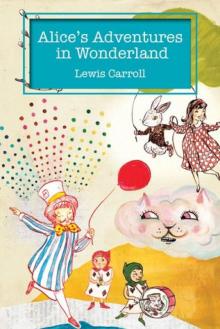 Alice's Adventures in Wonderland & Through the Looking-Glass
Alice's Adventures in Wonderland & Through the Looking-Glass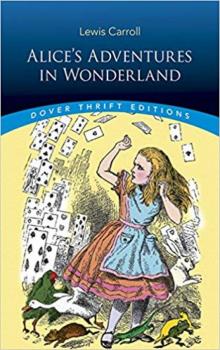 Alice's Adventures in Wonderland
Alice's Adventures in Wonderland O Frabjous Day!
O Frabjous Day!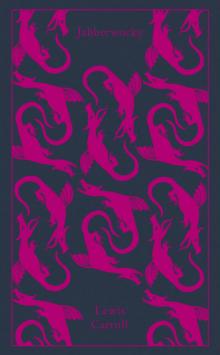 Jabberwocky and Other Nonsense
Jabberwocky and Other Nonsense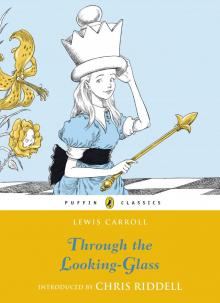 Through the Looking-Glass and What Alice Found There
Through the Looking-Glass and What Alice Found There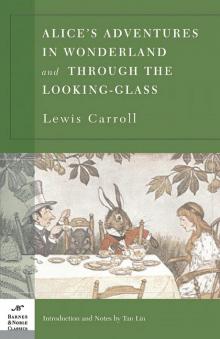 Alice's Adventures in Wonderland and Through the Looking Glass (B&N)
Alice's Adventures in Wonderland and Through the Looking Glass (B&N) Alice's Adventures in Wonderland and Through the Looking Glass (Barnes & Noble Cla
Alice's Adventures in Wonderland and Through the Looking Glass (Barnes & Noble Cla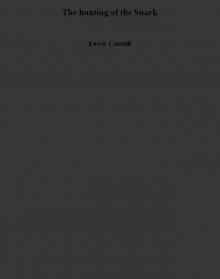 The hunting of the Snark
The hunting of the Snark The Complete Alice in Wonderland (Wonderland Imprints Master Editions)
The Complete Alice in Wonderland (Wonderland Imprints Master Editions) Alice in Wonderland: The Vampire Slayer
Alice in Wonderland: The Vampire Slayer Phantasmagoria and Other Poems
Phantasmagoria and Other Poems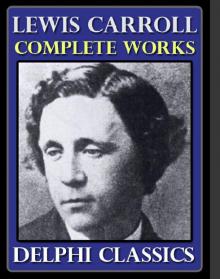 Complete Works of Lewis Carroll
Complete Works of Lewis Carroll Alice's Adventures in Wonderland illustrated
Alice's Adventures in Wonderland illustrated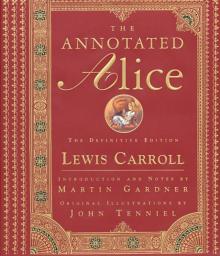 The Annotated Alice: The Definitive Edition (The Annotated Books)
The Annotated Alice: The Definitive Edition (The Annotated Books) Through the Looking Glass
Through the Looking Glass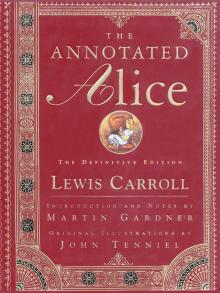 The Annotated Alice
The Annotated Alice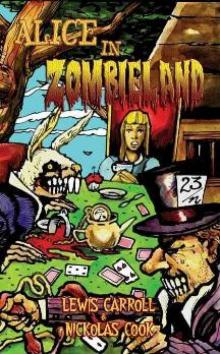 Alice in Zombieland
Alice in Zombieland